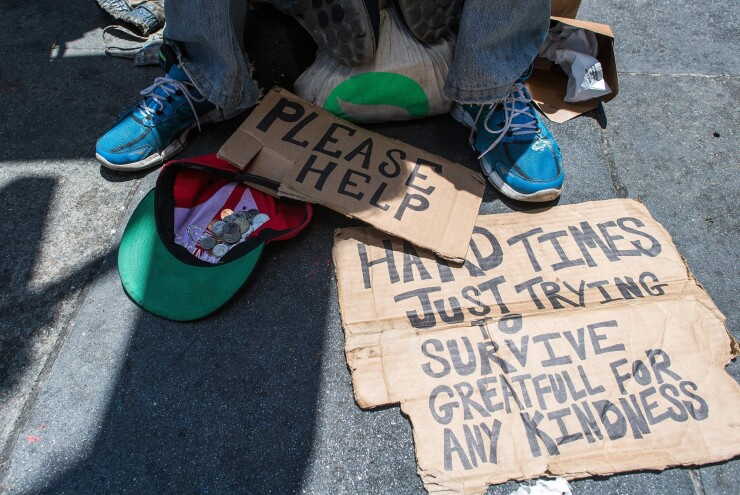San Francisco voters approved a tax increase on large businesses to boost services for the homeless, an initiative that was opposed by the mayor and had divided leaders of the city’s booming technology industry.
The ballot initiative, Proposition C, calls for an additional tax of at least 0.175 percent on businesses’ gross receipts above $50 million. It’s expected to generate about $300 million a year for homeless aid, roughly doubling the city’s current funding. About 60 percent of voters were in favor of the initiative with all precincts reporting, according to the San Francisco Department of Elections.
Homelessness is a deepening crisis in San Francisco, where soaring real estate costs and tech-fueled wealth are exacerbating economic inequality. The most recent official count pegged the homeless population at about 7,500. Mayor London Breed, elected in June, has committed to addressing the problem but opposed Prop C, arguing that the city needs to be more efficient about spending money already dedicated to helping people with nowhere to live.

Tech companies including Square Inc., Stripe Inc. and Lyft Inc. had also come out against the initiative, arguing that it would disproportionately tax businesses with large revenue and narrow margins. But it won support from prominent advocates including Marc Benioff, the billionaire co-founder and co-chief executive officer of Salesforce.com Inc., the city’s largest tech employer. Benioff donated millions to support the initiative and publicly pushed the plan.
Prop C’s victory means the homeless will have a home & the help they truly need! Let the city come together in Love for those who need it most! There is no finish line when it come to helping the homeless. Thank you amazing supporters of Prop C! pic.twitter.com/0JOXCua1m1
— Marc Benioff (@Benioff) November 7, 2018
The dispute got personal at times between Benioff and Jack Dorsey, the CEO of Square and Twitter Inc. Dorsey came out against the measure after Benioff had thrown in his support, saying it was unfair because some companies would be disproportionately affected.
“The amazing thing is, these companies can afford it,” Benioff said in a Bloomberg TV interview last week. “For us, it’s just a $10 million tax. These are immaterial amounts to us. Ten million dollars doesn’t mean anything, you know, that’s less than the plane Jack Dorsey is going to fly around on.”
Opponents of the measure pointed to the fact that it didn’t get two-thirds approval of the electorate, which is required for tax hikes proposed by local governments for particular purposes. If that bar is extended through litigation to initiatives put forth by citizens, the measure would fail, they said. “Proposition C was full of empty promises from the start,” said Jess Montejano, a spokesman for the campaign against it.
Breed said in a statement that she will work with both sides to plan how to deliver on the measure’s goals and address any legal questions.
“The voters sent a clear message that they want an increase in funding to help meet this urgent challenge,” she said Wednesday. “I agree we need to build more housing and shelters, help those suffering from mental illness and substance-use disorders, and help people to exit homelessness — and business can pay more to make that happen."
Many cities on the American West Coast are facing homeless and housing crises. Seattle passed a per-worker tax on employees this year, only to repeal the levy after strenuous opposition from Amazon.com Inc. and the city’s business community.
San Francisco’s initiative will affect as many as 400 businesses, the city’s controller said in a September report. Those in the information and financial services industries would pay nearly half of the $300 million a year that it’s projected to generate. The controller said the proposed tax could result in job losses, though they would be small in the context of the city’s large economy.
In addition to Benioff, Prop C had the support of California Senator Dianne Feinstein and House Minority leader Nancy Pelosi, who represents San Francisco. Both won re-election Tuesday.





